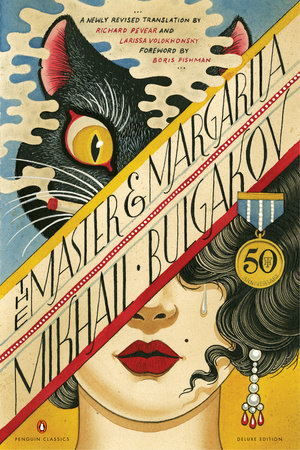Be honest: what comes to mind when you hear the words “Russian literature”? Is it snowy peaks, grand churches, gulags? What used to come to mind for me were long, dour door-stoppers without a hint of whimsy or hope or comfort in sight. The word “funny” certainly didn’t come to mind. Well, have no fear, The Master and Margarita is here. This book brings surprising depth and warmth as well as a diverse cast of kooky characters.
The (relatively short) novel by Mikhail Bulgakov was first published in an uncensored form in 1973 as a scathing satire of Soviet life under Stalin. It concerns the exploits of Satan (Woland) and his entourage, including but not limited to a giant talking cat, some vampires, a Master of Ceremonies without a head, and witches. Throughout the book, they manage to infiltrate the Soviet literary scene, cleverly dispatching anyone who gets in their way, while teaching darkly funny, twisted lessons that comment upon the evils of vanity and greed present within society. This narrative is interspersed with flashbacks to the trial of a Jesus figure, Yeshua, his disciple Matthew Levi, and Pontius Pilate. Weaving through this narrative is the subplot of the Master (a character based loosely on Bugakov himself), a writer, and his true love and muse, Margarita. These threads create a tapestry of a meta-narrative depicting themes of creativity, madness, faith, and the state.
One of the aspects that makes this book so deeply enjoyable to read, as I have alluded to, is the fact that it manages to balance dry wit and goofy slapstick in equal measure. This is a book of and about paradoxes: Of creativity in a totalitarian state, questions of the soul and salvation, and the necessity of the existence of evil in order for good to exist. For example, in Margaritas’ first conversation with the aforementioned giant talking cat, they banter about the quality of alcohol
‘Is that vodka?’ Margarita asked weakly.
The cat jumped up on his chair in resentment.
‘Good heavens, Queen,’ he croaked, ‘would I allow myself to pour vodka for a lady? It’s pure alcohol!’
And then as the novel draws to a close, we get this wonderfully ridiculous exchange between two demons and a woefully underprepared and ordinary citizeness:
‘You’re not Dostoyevsky,’ said the citizeness, who was getting muddled by Koroviev.
‘Well, who knows, who knows,’ he replied.
‘Dostoyevsky’s dead,’ said the citizeness, but somehow not very confidently.
‘I protest!’ Behemoth exclaimed hotly. ‘Dostoyevsky is immortal!’
The tone tends toward the literary, absurd, and ironic throughout, but with a warmth and affection for almost all involvedI read the acclaimed Pevear and Volokhonsky translation, which is very good, and appears to capture the spirit of the novel quite well. The end notes are also excellent. The novel is given extra potency in that it was secretly written during Stalin’s reign (From 1928 to 1940). The chronically ill Bulgakov dictated the novel to his wife, though he went through many manuscripts; He even left a note for himself on one:“Finish it before you die.” It is astounding to me that, despite his personal miseries and tortures, Bulgakov managed to write one of Russia’s most popular novels that is also considered by many to be one of the greatest, most joyful and hilarious novels of all time.This makes it even more of a shame that it does not receive much attention outside of Russia, especially in the US. However, it is a favorite of people like Daniel Radcliffe and Pedro Pascal.
As our time together comes to a close, I will leave you with this, dear reader: If every copy of The Master and Margarita were to be gathered up and apparently destroyed, I would tell you to not be alarmed. I would be of the utmost confidence that you would still be able to read it, because, as Woland puts it: “Manuscripts don’t burn.”After all, It didn’t work for the Master, and it didn’t work for Bulgakov,who also tried to burn a copy of his manuscript, and we are still reading it Around 80 years later. If you’re interested in Russian literature or history or communism or religion or oppression or gender roles or true love or romantic fairy tales or questions of censorship, then I highly recommend this book.


Mitchell,
This is definitely going on my list! Russian literature is my guilty pleasure. I am an unapologetic Tolstoy fan, but when I saw that you said this book was relatively short I got excited and 1500-page books are not for the faint of heart. I’ll keep you updated!
Sam
Honestly the title itself really got me, I’ve never heard or read a book including the word margarita in the title. This seems like a very fun book to read and those quotes you included from it really shows its sense of humor incorporated within the novel. I mean who doesn’t want to read a funny and SHORT book.